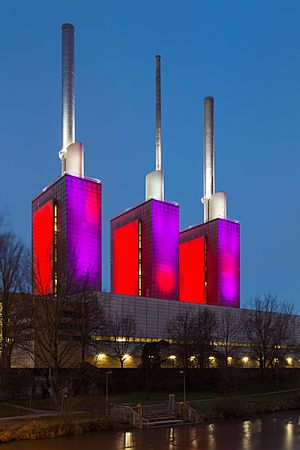Gas-fired power plant facts for kids
A Gas-fired power plant is a special kind of power plant that uses natural gas to make electricity. Imagine a giant engine that burns gas to spin a big fan, and that fan helps create the power we use every day! About one-quarter (or 25%) of all the electricity used around the world comes from these types of power plants. When natural gas is burned, it releases gases that can contribute to global warming, so scientists are always looking for cleaner ways to make electricity.
Contents
How Gas Power Plants Make Electricity
Gas-fired power plants work a bit like a car engine, but on a much bigger scale!
The Simple Cycle
- First, natural gas is brought into the plant.
- Then, the gas is burned in a special engine called a gas turbine. This burning creates very hot, fast-moving gases.
- These hot gases push against the blades of the turbine, making it spin very fast.
- The spinning turbine is connected to a generator, which is a machine that turns motion into electricity.
- This electricity is then sent out to homes and businesses through power lines.
Combined Cycle Plants
Some gas power plants are even more efficient! They are called combined-cycle power plants.
- They use the simple cycle process first.
- But instead of letting the hot exhaust gases from the gas turbine go to waste, they capture this heat.
- This heat is used to boil water, creating steam.
- The steam then spins another turbine, called a steam turbine, to make even more electricity!
- This way, they get more power from the same amount of natural gas, which is a smart way to save energy.
Why We Use Gas Power Plants
Gas-fired power plants are popular for several reasons:
- Quick Start: They can start up and shut down much faster than some other types of power plants. This is useful when electricity demand suddenly goes up or down.
- Flexible: They can easily adjust how much electricity they make. This helps keep the power grid stable.
- Cleaner Fuel: Compared to coal, natural gas burns more cleanly, meaning it produces less air pollution like sulfur dioxide and nitrogen oxides.
Environmental Impact
While natural gas is cleaner than coal, burning it still creates greenhouse gases, mainly carbon dioxide.
- These gases trap heat in the Earth's atmosphere.
- This trapping of heat contributes to global warming and climate change.
- Scientists and engineers are working on ways to make these plants even cleaner, like capturing the carbon dioxide before it goes into the air or using hydrogen as a fuel instead of natural gas.
Images for kids
-
A cogeneration plant in Berlin
-
Fingrid Oyj's gas turbine power plant in Forssa, Finland
 | Lonnie Johnson |
 | Granville Woods |
 | Lewis Howard Latimer |
 | James West |




